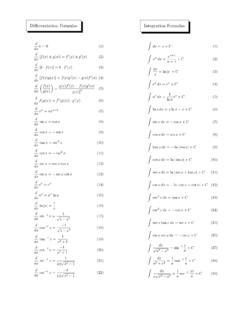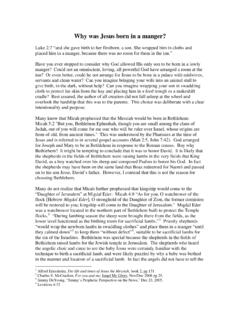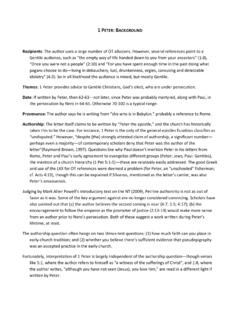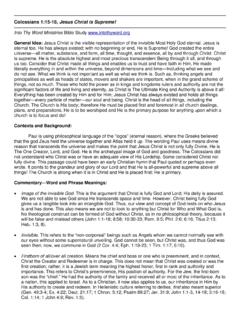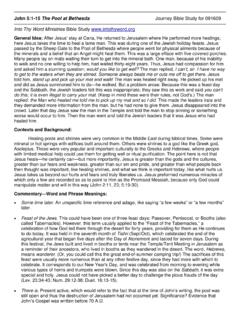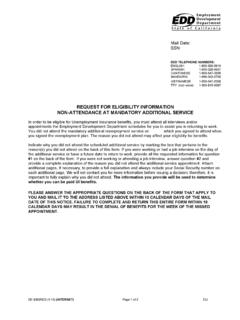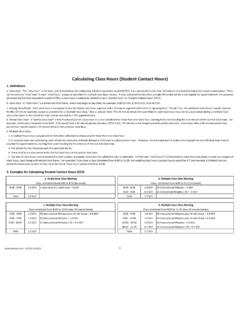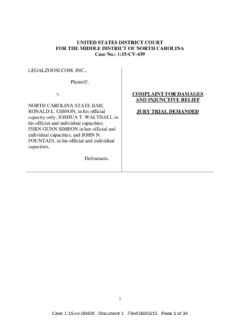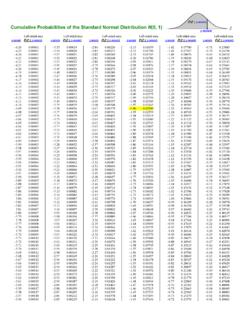Transcription of Romans 14:1-15:13 - University of Rochester
1 The Holy Huddle 1 Friday, November 18th, 2016 Romans 14:1-15:13 1. In this passage Paul is addressing, as he has through all of Romans , two groups. Here, one group has weak faith (14:1), and the other strong. The weak pass judgment on the strong and the strong despise the weak. We have some clues as to their identity, since those with weak faith avoid meat (14:2) and unclean foods (14:20) and observe certain religious days (14:6). What is the most likely identity of the weak group, and why? a. Gentile converts who avoid meat which, though sold at the butcher s was purchased by the butcher from temples which had used it in sacrifice to pagan gods (so, the same group as in 1 Cor 8; but note, idols aren t mentioned here) b.
2 Ascetics: Jewish Christians or Gentile Christians who engage in supererogatory1 activities to achieve greater spirituality through denial c. Legalists: Those who haven t yet realized that we are saved through faith and thus continue to perform works they believe are necessary for salvation (so why doesn t he condemn them as he did in Gal 1:8+?) d. Jewish Christians who grasp the faith just fine but want to continue with the Jewish kosher laws and holy days 2. Everyone has a conscience (2:15), a sort of moral intuition. It s influenced by our moral norms and while it isn t necessarily right (1 Cor 8:7-12; 10:25-29), it can be guided by the Holy Spirit (9:1-2).
3 By violating your conscience, even when it s wrong, you can make it weak (1 Cor 8:10-11), defiled (1 Cor 8:7) and wounded (1 Cor 8:12). In context, some are choosing to treat things as unclean which Jesus and Paul made clear aren t (14:20; Mk 7:19). So why is it better for the weak to follow a misaligned conscience which is telling them something is wrong? Isn t right and wrong a matter of absolute truth, and not of being convinced in their own minds (14:5)? 3. What does Paul specifically mean when he warns that the strong may injure and ruin (14:15-16) the weak, making them stumble (14:13)?
4 Does Paul intend this to be a permanent solution? What does Paul mean by whatever does not proceed from faith is sin (14:23)? 4. While Peter was living in Antioch he associated freely with both Jewish and Gentile Christians. Then, out of deference to the scruples of the Jews, he chose stop eating with the Gentiles (Gal 2:11-14). On the surface this appears to be an application of Paul s rule about showing flexibility to the person of tender conscience, but Paul himself condemns Peter for it. Why? 5. Shortly after Peter s incident, the Jerusalem Council decided that Gentiles need not follow the Law of Moses but nevertheless should avoid food sacrificed to idols and food which has not been drained of blood and fornication (Acts 15:20, 29).
5 Is this a valid example of Paul s tender-conscience principle? If so, did it make sense for King Alfred the Great of England in the ninth century to include these restrictions in his legal code? 6. Here, Paul instructs those who have embraced the freedom of the gospel to voluntarily limit themselves by not doing something that would make another believer feel guilty. Paul says this follows the example of Jesus, who did not please himself (15:3). Did Jesus ever voluntarily choose not to do something admissible for the sake of another s weak conscience? 1 Beyond the call of duty The Holy Huddle 2 Friday, November 18th, 2016 7.
6 The church is full of divisions regarding what the Reformers called adiaphora, disputable matters which are not specifically forbidden by Scripture. The principle given here is that the group not offended should try to accommodate the group which is. Which of the following should be treated using this principle2, and which is the weaker party? Who should voluntarily be limited and how? a. Vegetarians, vegans and carnivores b. Those who avoid R-rated movies, salty HBO series, etc. and those who don t3 c. Alcohol at communion or church gatherings d. Those who wish to treat the sanctuary as holy ground vs.
7 Those who don t e. Women who wear modest dress vs. those with socially acceptable but a bit more revealing dress f. Muslims who wear a hijab head covering for modesty in the presence of males outside the family g. Those who support women in leadership and those who believe it violates Scriptural mandate h. Those who, despite sympathy for the poor and immigrants, ultimately votes on the basis or concern for the unborn and SCOTUS nominations i. Those who approve homosexual behavior and those who don t j. Those who are offended by too much humor in discussion of Scripture k. Pacifists v.
8 Just-war Christians l. Those who dress up for church and those who don t m. Those who are willing to work on Sundays and those who aren t (perhaps even 7th-Day Adventists) n. Those who subscribe to weekly confession of sin and those who don t o. Sprinkling v. immersion (Stott mentions this, but is it a matter of conscience?) Fun Fact: In the 6th century the desert fathers John the Prophet and Barsanuphius of Gaza wrote letters, a sort of hermits advice column, largely addressing problems of interest to monks. Not surprisingly, the weaker brother problem comes up, and is addressed in the context of brothers who leave the table early so they don t overeat (and thus annoy the others); those who look down on others who offer modest only hospitality; and those who bathe too often: I am embarrassed that I might scandalize those who think highly of me, expecting that I would refuse a bath because of my piety.
9 Why is this happening, father? (The Fathers of the Church, Vol 114, trans. John Chryssavgis, p. 281.) Bonus fun fact: For seventeenth-century Puritans a hotly contested adiaphora was the practice of exchanging wedding rings. 2 Note Carson s useful point, That something is disputed does not make it theologically disputable ( On Disputable Matters , Themelios (2015): 383 88, where Carson addresses explains why homosexuality isn t adiaphora). Stott suggests you discern whether an action puts you in the weaker camp by asking, Can I thank God for this? Can I do this unto the Lord?
10 (cf. 14:6). 3 I was surprised to learn a former pastor of mine liked to watch what I found a very racy TV show. Am I the weaker believer? The Holy Huddle 3 Friday, November 18th, 2016 Leader s Notes: This passage may be easy to think you have right when you don t, quite. Some things worth noting: First, Stott s probably right in seeing this as not being about meat sacrificed to idols, as in 1 Cor 8. In the Corinthian church there were young believers who were converts from paganism. Their consciences were hurt by eating meat sacrificed to idols because it was threatening to draw them back into that world.


